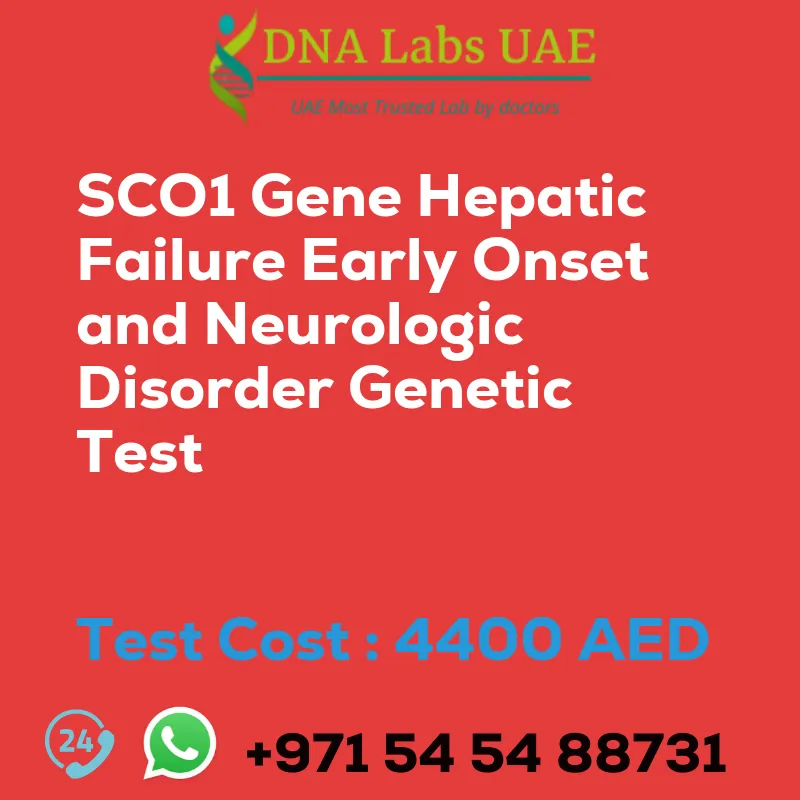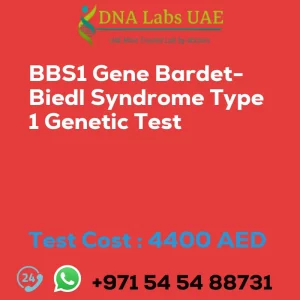SCO1 Gene Hepatic Failure Early Onset and Neurologic Disorder Genetic Test
About the Test
The SCO1 gene is responsible for encoding a protein involved in the assembly of cytochrome c oxidase, an essential component of the electron transport chain in mitochondria. Mutations in the SCO1 gene can lead to a variety of clinical presentations, including hepatic failure, early onset of symptoms, and neurologic disorders.
NGS (Next-Generation Sequencing) genetic testing is a method used to analyze multiple genes simultaneously, allowing for the identification of genetic variations or mutations that may be responsible for a particular condition. In the case of SCO1 gene-related disorders, NGS testing can be used to detect mutations in the SCO1 gene and provide a diagnosis for patients presenting with hepatic failure, early onset symptoms, and neurologic disorders.
Test Details
- Components: SCO1 Gene Hepatic Failure Early Onset and Neurologic Disorder Genetic Test
- Price: 4400.0 AED
- Sample Condition: Blood or Extracted DNA or One drop Blood on FTA Card
- Report Delivery: 3 to 4 Weeks
- Method: NGS Technology
- Test Type: Hepatology Nephrology Endocrinology Disorders
- Doctor: General Physician
- Test Department: Genetics
Pre Test Information
Clinical History of Patient who is going for SCO1 Gene Hepatic failure, early onset, and neurologic disorder NGS Genetic DNA Test. A Genetic Counselling session to draw a pedigree chart of family members affected with SCO1 Gene Hepatic failure, early onset, and neurologic disorder NGS Genetic DNA Test gene SCO1.
Test Process
The NGS genetic test involves obtaining a DNA sample from the patient, usually through a blood sample or a cheek swab. The DNA is then sequenced using NGS technology, which generates large amounts of genetic data. This data is then analyzed using bioinformatics tools to identify any variations or mutations in the SCO1 gene.
If a mutation is identified in the SCO1 gene, it can help confirm a diagnosis of a SCO1 gene-related disorder and provide valuable information for patient management and treatment. Additionally, genetic testing can also be used for carrier screening, prenatal testing, and family planning purposes.
It is important to note that genetic testing should be ordered and interpreted by a qualified healthcare professional, such as a genetic counselor or a medical geneticist, who can provide appropriate counseling and guidance based on the test results.
| Test Name | SCO1 Gene Hepatic failure early onset and neurologic disorder Genetic Test |
|---|---|
| Components | |
| Price | 4400.0 AED |
| Sample Condition | Blood or Extracted DNA or One drop Blood on FTA Card |
| Report Delivery | 3 to 4 Weeks |
| Method | NGS Technology |
| Test type | Hepatology Nephrology Endocrinology Disorders |
| Doctor | General Physician |
| Test Department: | Genetics |
| Pre Test Information | Clinical History of Patient who is going for SCO1 Gene Hepatic failure, early onset, and neurologic disorder NGS Genetic DNA Test. A Genetic Counselling session to draw a pedigree chart of family members affected with SCO1 Gene Hepatic failure, early onset, and neurologic disorder NGS Genetic DNA Test gene SCO1 |
| Test Details |
The SCO1 gene is responsible for encoding a protein involved in the assembly of cytochrome c oxidase, which is an essential component of the electron transport chain in mitochondria. Mutations in the SCO1 gene can lead to a variety of clinical presentations, including hepatic failure, early onset of symptoms, and neurologic disorders. NGS (Next-Generation Sequencing) genetic testing is a method used to analyze multiple genes simultaneously, allowing for the identification of genetic variations or mutations that may be responsible for a particular condition. In the case of SCO1 gene-related disorders, NGS testing can be used to detect mutations in the SCO1 gene and provide a diagnosis for patients presenting with hepatic failure, early onset symptoms, and neurologic disorders. The NGS genetic test involves obtaining a DNA sample from the patient, usually through a blood sample or a cheek swab. The DNA is then sequenced using NGS technology, which generates large amounts of genetic data. This data is then analyzed using bioinformatics tools to identify any variations or mutations in the SCO1 gene. If a mutation is identified in the SCO1 gene, it can help confirm a diagnosis of a SCO1 gene-related disorder and provide valuable information for patient management and treatment. Additionally, genetic testing can also be used for carrier screening, prenatal testing, and family planning purposes. It is important to note that genetic testing should be ordered and interpreted by a qualified healthcare professional, such as a genetic counselor or a medical geneticist, who can provide appropriate counseling and guidance based on the test results. |








